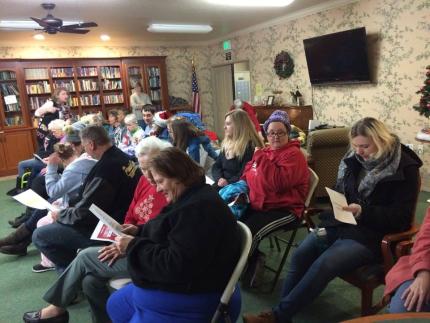Friendship Club Teaches Members to Advocate for Themselves

Friendship club members singing carols during last Christmas season.
Friendship Club of Ripon
Christine Hager, a CRC regional disability advocate for Classis Central California, spent several hours helping Lisa Utsey prepare a presentation.
Step by step, they worked on the talk and slideshow in which Utsey planned to encourage people to have patience and be committed to helping persons with intellectual and developmental disabilities to speak out and advocate for themselves.
Utsey, a person with intellectual disabilities, is a member of the Friendship Club of Ripon, Calif. Made up of about 25 members from all over the area, the Friendship Ministries group is based at Immanuel Christian Reformed Church in Ripon.
As part of the group, Utsey has developed the skills to speak to a range of audiences, including groups of disability attorneys, legal experts, educators, and social workers.
“Lisa has now become a requested speaker to get the word out and teach the community how to work with people with disabilities — and to speak to people with disabilities about how they can communicate their concerns to others,” said Hager, who along with Geri Witt is a leader of the Friendship Ministries group at the church.
With deep roots in the Christian Reformed Church and now an independent ministry, Friendship Ministries helps churches from more than 75 denominations around the world share God’s love with people who have intellectual disability and bring them more fully into the lives their congregations. A core element is the Together Small Groups Bible study curriculum designed for groups that include people with and without intellectual disabilities.
Hager and Witt, both members of Immanuel CRC, decided a few years ago to revive a Friendship club that had stopped meeting for a while.
Since then, the club has grown and flourished, helping club members such as Lisa Utsey become leaders to advocate for their wants and needs.
“It can be tempting for people without disabilities to decide what a person with a disability cannot do. I think this especially happens to people who have intellectual disabilities,” said Mark Stephenson, director of the CRC’s Office of Disability Concerns.
“I’m excited to see how Christine and Geri have decided to explore what their friends with intellectual disabilities can do — how they are able to train and encourage them to exercise their leadership muscles not only in the Friendship group but also in the wider community.”
The first year they began the group, said Hager, they used Friendship materials, but when the year was over, members said they would like more input on how the Friendship resources were used and on what they as members of the group could do.
“They told us about things they would like to see contained in the Bible studies and asked if they could get together for socializing and finding ways to be more active in the community,” she said.
Out of this came a schedule in which they meet one week for Bible study and another week for some kind of service activity, such as singing carols at a senior center in the Christmas season — and then on another week they set aside time to mingle, have a meal together, or enjoy a cookout.
And a key aspect has become helping club members develop as leaders.
For instance, said Hager, members of the group elect leaders who meet twice a year to talk about how things have been going and to make plans for the upcoming year.
“This planning can include input on how they are involved, on group rules, curriculum, and more,” she said.
In addition, these Friendship group leaders go to quarterly meetings of people with intellectual and developmental disabilities who are leaders of other groups (not only Friendship groups) in the area.
“Together they talk about leadership in their groups, about systemic problems in culture and community, and about leadership skills,” said Hager.
Hager said she and others help these club members become leaders by teaching such skills as public speaking, being professional, how to negotiate and compromise when there are difficulties, and how to work with a facilitator.
And this is where Hager has come in, working as a facilitator and spending several hours helping Utsey prepare for her presentations.
Utsey, who lives on her own, wasn’t a public speaker when she joined the club — but as she developed her leadership skills in the Friendship group, she grew in confidence and in connecting with other people, said Hager.
Besides working with Hager, Utsey has enjoyed the help of other facilitators as well.
During a recent presentation to a large group, Utsey used a slide show and spoke about the role facilitators play for persons such as herself. As she spoke, she received help once in awhile from Hager and was able to present her entire message.
In part, said Utsey, with her growing sense of confidence, “The self-advocate’s voice matters. It’s important for you [facilitators] to communicate with the self-advocate.”
People such as herself who want to advocate for themselves, said Utsey, often know what they want to say or share but might need help figuring out how to say it. And that’s where the facilitators can come in.
“Sometimes self-advocates even ask their facilitator to speak for them, but remember they [the facilitators] are just using their voice to help the self-advocate.”
In closing, Utsey emphasized that facilitators need to have patience and be attentive:
“Please keep making eye contact with the self-advocate and talking to the self-advocate. Check in with the self advocate to make sure they understand you.”


